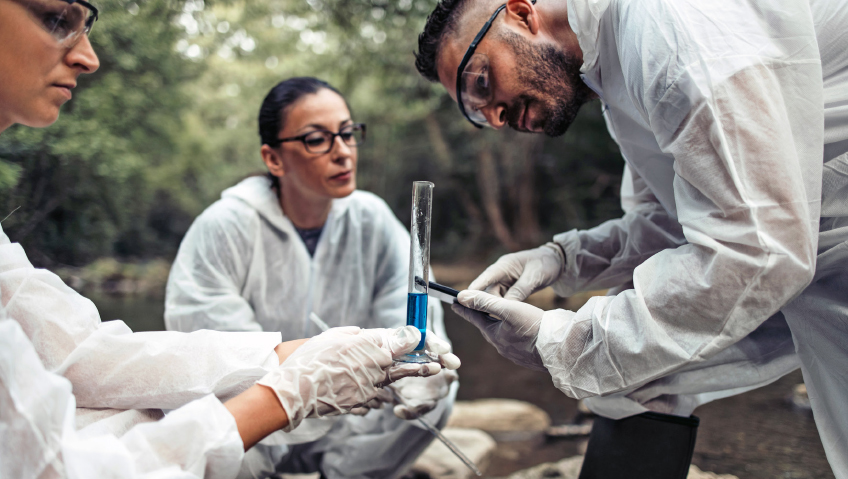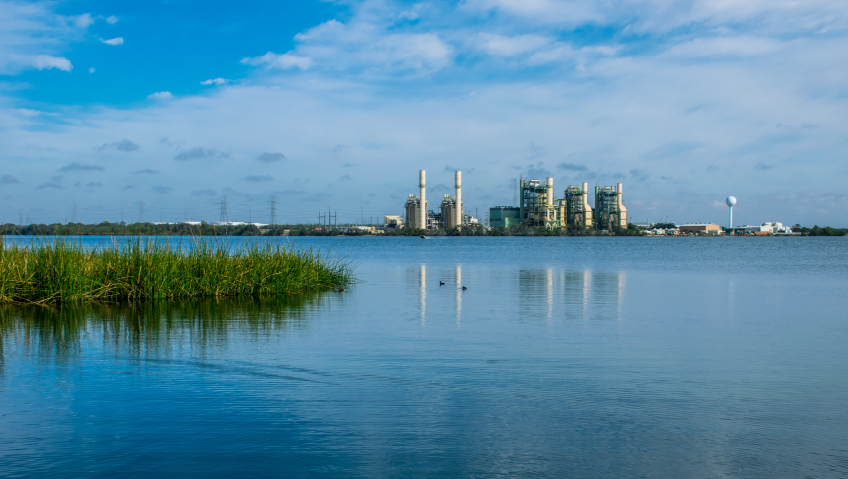As a part of the New Hampshire community since 1986, Capital Well Clean Water Center strives to provide safe, clean water to clients via a wide range of products that deliver clean water to both homeowners and businesses. The company’s breadth of comprehensive services, including irrigation installation, maintenance, and winterization, helps clients preserve water and promote greener, healthier lawns and gardens.
“The company was started with hard work and dedication and good morals, creating the business we still model ourselves after, almost 40 years later,” says Dan Grace, Vice President of Sales. “The founders led by example and we follow them. They demanded a high level of professionalism which was really beneficial for us to see.”
The well-drilling industry is a niche business, one that requires intensive capital investment with drill rigs costing more than $1 million, along with a service truck, a water truck, and employees that need both a commercial driver’s license and the willingness to work in occasionally dangerous conditions and inclement weather.
“It’s a tough industry to succeed in without traumatic injuries or setbacks,” Grace says. He himself “hit the ground running” with five years in the field and 12 years in project management and sales, getting out on the road, spreading the word about the company, and drumming up business. Meanwhile, his future business partners were still in the field grinding and learning other aspects of the industry.
In 1997, Jon Swain came aboard, was promoted to Sales Manager in 2000, and is now President, working with Adam Dragon, Vice President, Drilling Operations, Joe Dragon, Vice President, and Greg Dragon, Vice President, Water Treatment.
“The company has almost tripled in size in the 10 years since we’ve taken over,” says Grace of the partners, of whom he’s the only non-family member. While they all work well together meeting the challenges that arise, one of the biggest they face is finding quality, hardworking employees.
“Fortunately, younger folks can see somebody like me that came in at the bottom, worked from the ground up, and now owns the company equally with my other partners,” Grace says. “That opportunity is there for anybody. It doesn’t require an expensive education; it requires drive and enthusiasm. It’s an opportunity for somebody who may struggle in a school atmosphere but has diligent hard work and takes pride in what they do.”
It’s also a chance to learn a trade that’s not going away, he adds. People will always need water, and it’s a renewable resource that requires protection.
“And that’s another part of our mission. It’s only renewable if properly managed,” he says. “You need to be smart about groundwater, following the rules and installation practices to prohibit contamination.”
Protecting water is indeed the number one priority for Capital Well Clean Water, starting with proper construction of water wells, knowing the area, and being educated in good practices. “It’s important that everybody here cares,” Grace says. “It’s not just a job; any error can be critical when you’re creating a conduit into the planet that’s 1,000 feet deep into bedrock.”
The team is passionate about maintaining quality standards, he adds. “It’s what propels us—caring about the groundwater industry. It has led us into how we are going to manage this better, and not only that, but manage emissions.”
The green side of the business involves forging relationships with HVAC contractors installing heat pumps and the ductwork that need a ground source—somebody to tap into the planet.
“We have the tools to do so,” Grace says. “So we got to be partners with a lot of HVAC contractors and it revolutionized the way geothermal heating and cooling was done in the state. From 2008 until 2014, there were a lot of advancements and more efficiencies made, and we were saving people 50 to 70 percent of energy costs for their homes and eliminating fossil fuels.”
Capital Well itself runs a Net Zero operation, with geothermal heating and cooling in both of its offices in northern and southern New Hampshire. It has also applied a 186-panel solar system to offset its electricity consumption, and in the big shops, it utilizes oil from its vehicles twice. The second time is when it’s burned in the shops to heat the bigger spaces where geothermal alone isn’t practical.
“We try to be as renewable as possible and practice what we preach,” says Grace. “And it’s not just because we love the planet, it also makes fiscal sense.”
Another area of sustainability is groundwater withdrawal and extraction, which helps homeowners and businesses better manage irrigation systems for lawns and gardens.
Wells in New Hampshire continue to be driven deeper to reach water, and in some congested areas where subdivisions have been put in, lawn sprinklers are utilized on many big lawns to keep them green, but they’re not properly managed. While technology has come a long way, the irrigation systems haven’t caught up.
“We figured we should be part of the distribution not only to the house but also to the lawns,” Grace explains. “We can balance the system to work appropriately with what you have for groundwater provided out of your well, because every well is different. Some are minimal in production, and others have tremendous volumes.”
The company’s newest offering is Intuitive Hydrawise Software, an easy-to-use solution for efficient water management that provides detailed oversight of irrigation controllers. By supporting the adjustment of watering schedules and the ability to monitor piping and electrical systems, the system can achieve up to 50 percent in water savings.
“It can watch the weather so it knows exactly when to run, how much to run, and when not to run,” Grace says. “If it’s raining out, we don’t want to waste the water. If it’s too hot out, we don’t want the water hitting the ground because nearly 70 percent of it is going to evaporate before it soaks in.”
And again, it’s an advancement for the company to expand and generate more revenue. It’s also about staying true to its roots and using the proper equipment to appropriately balance and maintain systems. The financial aspect can be tricky, however.
“It’s a crossroads and one of those decisions a company has to make,” Grace adds. “Are we cheap? No, if we were cheap, we wouldn’t have a box that can watch the weather and manage your water. We wouldn’t be able to use organic oils on our drill rigs, as we drill wells, so that we’re not injecting volatile organic compounds into the earth. We’re maintaining our morals. All these things come at a cost, but I think that cost is worth it and it’s justifiable to any customer who has a conscience.”
The company’s biggest challenge is staffing and keeping equipment running, he says, as well as successfully managing the amount of work the team is facing in the years following COVID.
“There are only so many hours in a day and we only have so much equipment to get it done,” Grace says. “When managing a list of over 160 people waiting for you to get a well drilled with a variable schedule, we don’t know when we’re going to be there, what we’re going to get, and how much it’s going to cost. Managing those variables to keep your customers happy is really challenging.”
More and more well companies are going out of business, he adds, particularly those that don’t have a succession plan, a younger generation that wants to take over and get their hands dirty. This has resulted in more market share coming to Capital Well.
“We have a lot of referral business,” says Grace. “Maintaining ethics and doing a quality job has gained us a tremendous amount of business.”
Despite the challenges, Capital Well has done a tremendous job over the years of maintaining a loyal roster of relationships, be it with homeowners, contractors, or builders.
This approach extends to employees as well. “We all get along and everybody’s friendly; we really don’t tolerate toxicity. Even if you have a great employee that shows up every day and they bust their butt, if they’re poison and affect the rest of the crew, they’ve got to go.”
Grace says that being of a younger generation of owners helps in relating to the company’s younger employees as well. “They can open the door and come in and bring their complaints to us. One of the biggest benefits of an open door policy at your company is that you can hear all about what’s going on.”
The company also prides itself on encouraging employees to make suggestions for improvements and offer solutions to problems.
“We alter the way we’re doing business based on that feedback,” says Grace. “We’d be foolish not to keep our ears open to what’s happening in the field. And I think having that open door squashes the festering that can occur. When somebody thinks you’re making a poor decision, it festers.”
Along with positive company culture, being family-owned has played a big part in the company’s success over the years,” he says. “Keeping those relationships without anybody getting too hostile is important. If we have trouble, we squash it right away and we don’t do it in front of the employees.”
Looking ahead, the team aims to continue growing in a positive manner while helping more clients in need.
“Our customers need water—cleaner water and safer water,” Grace says. “Those are the targets. Money is great, but that’s not our goal. We want to do a great job for everybody and the money will follow. Our focus is on that and just staying successful so we can be here for another 40 years servicing the customers who need us.”













